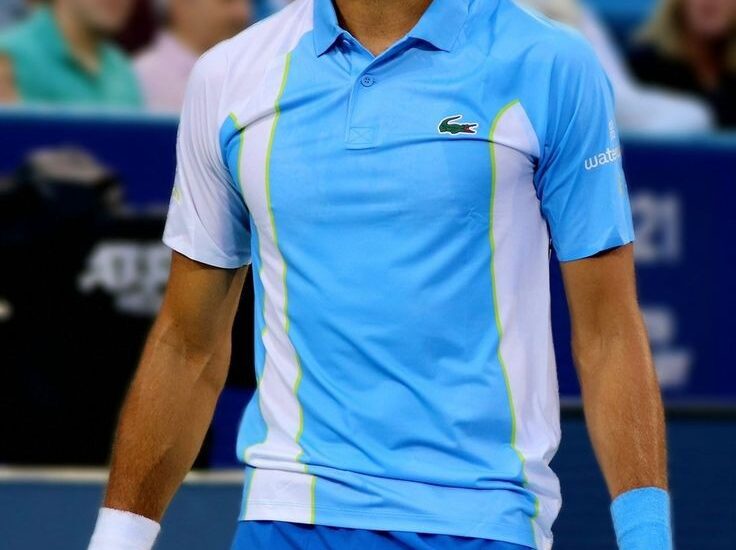
Disheartening Blow:A famous tennis player Novak Djokovic turned down a $400 million deal with a major sports network ESPN due to……
a move that shocked both the sports world and the business community, tennis legend Novak Djokovic recently declined a $400 million offer from ESPN, a major sports network. The deal, which would have cemented Djokovic’s place as one of the most lucrative athletes in sports media history, was reportedly part of an ongoing effort by ESPN to secure broadcasting rights and exclusive content with some of the most recognizable names in the global sporting arena. However, Djokovic’s decision to reject the offer has left many questioning not only the reasons behind his choice but also what it means for the future of sports media, athlete endorsements, and the evolving relationship between sports icons and the companies that seek to capitalize on their fame.
The Deal: What Was on the Table?
The $400 million deal presented to Novak Djokovic was structured as an exclusive broadcasting and endorsement agreement that would have included extensive media exposure, sponsorship deals, and a series of high-profile events where Djokovic would be prominently featured. The deal would have seen the Serbian tennis star involved in everything from exclusive interviews, training documentaries, and behind-the-scenes footage, to co-hosting major tennis broadcasts and other sports programming. ESPN, a powerhouse in the world of sports entertainment, was looking to secure Djokovic’s participation as part of a broader push to boost its content portfolio, particularly in the realm of tennis and international sports.
For an athlete of Djokovic’s caliber, this deal represented one of the most significant offers in sports media. With his ongoing dominance in tennis—winning multiple Grand Slam titles and breaking numerous records—his star power in the sports world has never been higher. For ESPN, securing such a high-profile athlete would have provided unparalleled access to exclusive content, attracting millions of fans both in the U.S. and around the world.
The Rejection: Why Did Djokovic Turn It Down?
While the offer was undeniably generous, Djokovic’s decision to decline the $400 million contract has left many people perplexed. According to sources close to the tennis star, the rejection was not motivated by financial concerns. Instead, Djokovic’s reasoning appears to be deeply rooted in his personal values, his desire for control over his own image, and his increasing focus on other aspects of his life and career beyond traditional sports broadcasting.
Personal Values and Beliefs
One of the key reasons Djokovic turned down the deal seems to be his commitment to certain personal values. Over the past few years, Djokovic has become known for his outspoken stance on various global issues, including health, wellness, and freedom of choice. He has been a vocal advocate for personal autonomy and has often spoken out against policies and mandates he believes infringe on individual rights. By rejecting the ESPN deal, Djokovic might be signaling his preference for maintaining his independence from large corporate entities, which often have their own agendas and expectations.
Desire for Control Over His Image
As an athlete with an already extensive media presence, Djokovic has been careful about how and where he appears in the public eye. Unlike other athletes who may eagerly sign lucrative endorsement deals with global corporations, Djokovic has consistently sought to maintain control over his public persona. His decision to turn down the ESPN offer could be seen as part of a broader strategy to maintain his autonomy, choosing instead to focus on projects that align more closely with his personal brand and values.
Exploring Other Avenues
Another factor influencing Djokovic’s decision may be his desire to explore alternative avenues outside of traditional sports broadcasting. While many athletes are content to sign endorsement deals with major networks, Djokovic’s interests have long extended beyond tennis. He has become involved in various business ventures, wellness initiatives, and philanthropic projects. Turning down such a massive deal could be seen as a way for Djokovic to prioritize his interests outside of the tennis court, seeking greater flexibility and control in pursuing opportunities that resonate more deeply with his personal passions.
A Shift Toward the Digital Age
As the sports world continues to evolve in the digital age, many athletes are moving away from traditional television deals in favor of more direct engagement with their fans through social media, streaming platforms, and personal content channels. Djokovic may have recognized that his influence and income opportunities could be better managed through these new media channels, where he can directly connect with his fanbase without the interference of corporate intermediaries.
You may also like
Archives
Categories
- ABA
- Actor
- Actress
- Actress and singer
- Band
- Baseball
- Basketball
- Boxer
- Broadcasting corporation
- CCR
- cricketer
- Cyclists
- Dart
- Drummer
- Fictional character
- Football game
- Formula 1
- Golf
- Guitarist and songwriter
- Guitarists
- Gymnastics
- Hockey
- Ice hockey
- Marathon
- MLB
- Motocross
- MotoGP
- Motorcross
- Musician
- Musician and drummer
- NFL
- NHL
- NRL
- Racer
- Red bull Racing
- Rider
- Rock band
- Rugby league
- Simone Biles
- Singer and songwriter
- Songwriter and musician
- Sport commentator
- Tennis
- Texas longhorns
- Track and field athlete
- Uncategorized
Leave a Reply